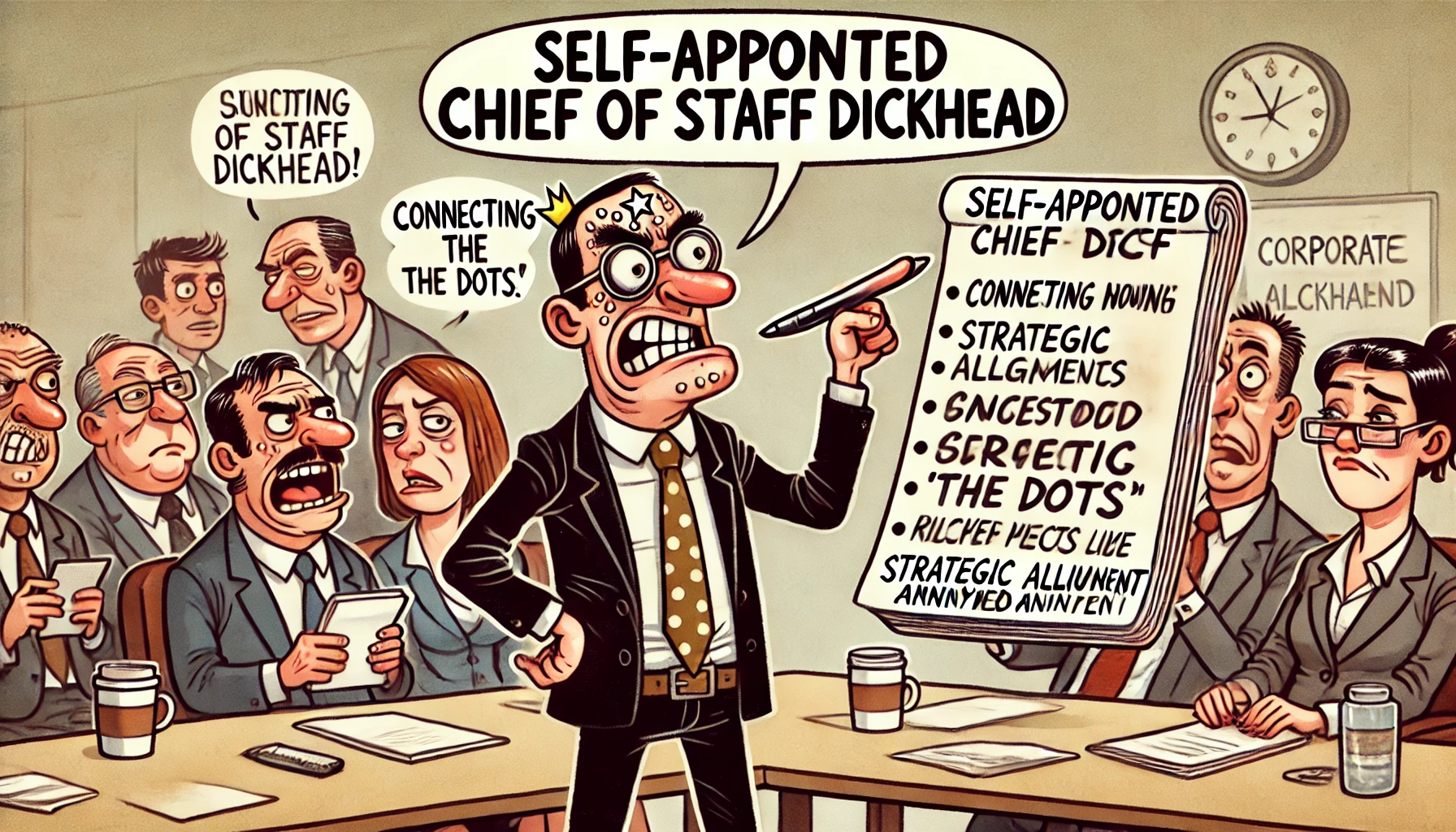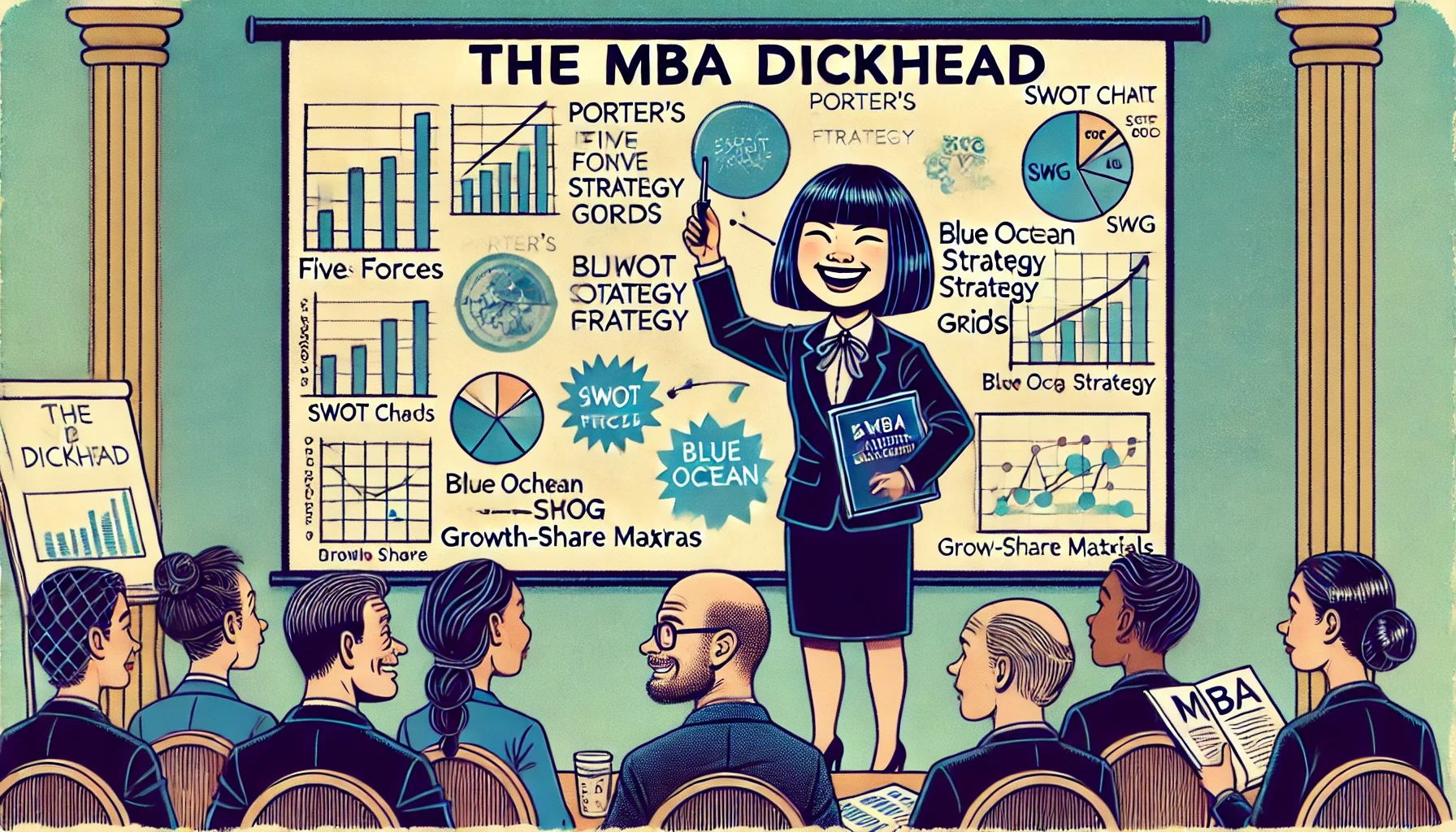1. Definition:
Meet the Self-Appointed Chief of Staff (Dickhead) – a non-official but dangerously real workplace figure lurking in the corporate jungle. This character doesn’t appear on any org chart, yet somehow infiltrates senior management circleswithout anyone quite knowing how. Often hailing from HR, Finance, or Legal, they have no actual job function relevant to the business at hand. And yet, by some dark corporate magic, they’ve inserted themselves into the highest levels of decision-making.
He proudly claims he’s “connecting the dots” across the organization – positioning himself as the all-knowing bridge between teams. In reality, all he does is manufacture confusion and spread misinformation, then watch as everyone scrambles to untangle the mess. This self-appointed genius worms into every meeting, discussion, and decision, armed with nothing but buzzwords and overconfidence. It’s the ultimate corporate con: knowing absolutely nothing, yet managing to be involved in absolutely everything.
2. Parody Scenario:
Morning: The Accidental Encounter Expert
It’s 8:00 AM, and our Self-Appointed CoS is already lurking near the CEO’s office, strategically loitering like a cat by the fish bowl. Clutching a coffee he doesn’t even want, he lies in wait for a “chance” executive encounter. Sure enough, the CFO appears, headed for the CEO’s door. Bump! The Dickhead accidentally collides with the CFO in the hallway. “Oh! Good morning!” he chirps, as if surprised. In the same breath, he slides into conversation: “I was just thinking about those Q3 budget figures – let me know if leadership needs a quick brief from the business side.” The CFO looks perplexed (since when does this guy handle budgets?), but mumbles something polite. Before the CFO can escape, our interloper has embedded himself into their chat, nodding along as if he were invited. He repeats a nugget he overheard earlier about “fiscal agility,” trying to sound informed. The result? By 8:05 AM, he’s already insinuated himself into a discussion that was never meant for him – a masterclass in being everywhere you shouldn’t be.
Mid-Morning: Meeting Crasher in Disguise
10:00 AM. A high-level strategy meeting is underway, and – surprise! – he’s in the room, despite not being on the invite list. The topic is a new product launch (completely unrelated to his role), but there he sits with a serious face and a pristine notepad. As the Marketing Director outlines a complex campaign, he nods sagely at every sentence, furiously jotting down terms he doesn’t understand. Someone mentions “leveraging our customer insights to drive engagement,”and he promptly echoes, “Absolutely, we need to leverage those insights to drive engagement,” as if on cue. Attendees exchange puzzled glances, silently wondering who let him in. Unfazed, our meeting crasher occasionally interjects with weighty-sounding phrases he half-understands: “Yes, we must ensure this is aligned with our strategic paradigms,” he declares at one point, furrowing his brow in earnest. Cue an awkward silence – not because the point was profound, but because it was pure gibberish. Yet he said it with such conviction that even the experts pause, momentarily second-guessing if they’re the ones who missed something. By meeting’s end, he hasn’t contributed a single original idea – just a lot of solemn nodding and jargon-parroting – but he walks out looking self-satisfied, convinced he’s now indispensable to the project’s success.
Lunchtime: Hovering and Hearsay
12:30 PM. Lunchtime. Senior executives gather in the cafeteria for a break, chatting casually over their salads – until they notice a shadow loitering nearby. Enter the corporate barnacle. He hovers dangerously close to the leadership lunch table, tray in hand, wearing an ingratiating grin. Eventually, with theatrical humility, he asks, “Mind if I join you? It’s great to hear what’s on leadership’s mind.” Without waiting for a real answer, he plops down into an empty seat. The CIO and COO exchange looks but say nothing as the intruder starts unwrapping his sandwich. As the execs talk shop (maybe the COO mutters, “We really need to improve customer retention this quarter…”), our self-appointed strategist seizes his moment. He leans in and drops a gem of vacuous insight: “That’s definitely something we’re hearing from the business.” He says it with utmost gravitas, as if he has a direct hotline to the soul of the company. A brief hush falls. “The business,” he claims — a wonderfully vague source that sounds important yet says absolutely nothing. Nobody questions what the business actually means (perhaps because it sounds legitimate… or maybe because they’re too busy choking down a laugh). The executives, caught between confusion and politeness, nod cautiously. He smiles and continues munching his sandwich, pleased with himself for contributing a meaningful-sounding nothing. In his mind, he’s now part of the inner circle’s lunchtime deliberations. After all, he just validated leadership’s thoughts with a mystical reference to “what we’re hearing” out there. (Out where? Who knows! But it sure sounded authoritative.)
Afternoon: The Derailment Artist
3:00 PM. A critical project update meeting is in session. The project team is presenting a long-awaited update to senior stakeholders – timeline on track, deliverables looking good. Enter our agent of chaos, sitting in (of course he’s there, even though this isn’t his project). Halfway through the presentation, he raises a hand, wearing his most concerned expression. “Sorry, just to interject,” he says, “have we considered how this initiative aligns with our global optimization strategy and the Q3 synergy targets?” The room goes silent. The project lead blinks twice, trying to decode that word salad of corporate buzzwords. Global… synergy… what? It’s a completely irrelevant, uninformed question – essentially nonsense – but it sounded vaguely important. One of the VPs, not wanting to appear out of the loop, slowly nods: “Hmm, that’s a good point. We should look into that.” And just like that, the meeting derails. The team spends the next 30 minutes scrambling to address a “concern” that didn’t exist five minutes ago. Whiteboards are filled with improvised diagrams of “Global Optimization Strategy” that have zero to do with the actual project. The original agenda? Out the window. Eventually, everyone agrees they need a follow-up meeting (two weeks delay!) to realign the project with these newly invented considerations. The project is officially sidetracked. And our Self-Appointed Chief of Staff Dickhead? He leans back with a satisfied smile, as if his nonsensical interjection saved the day. In reality, he’s done nothing but create a diversion, yet he basks in the praise for raising a “critical strategic question.”
Evening: After-Hours Ambush
7:15 PM. The office is mostly empty—lights off, desks vacant. But one office parasite remains. He’s “working late,” or so it would appear. In truth, he’s loitering in the executive suite, waiting for any straggling senior leader to wander by. He’s not writing emails or crunching numbers; he’s pretending to organize some papers (which are as blank and disorganized as his thoughts). Finally, the CEO emerges from a late call, looking exhausted. The CEO double-takes: “Oh, you’re still here?” That’s the cue our self-appointed advisor has been waiting for. “Yes, just wrapping up a few critical items,” he lies, casually stacking blank sheets of paper. As the CEO nods, our hero smoothly slides into “impromptu” deep conversation mode. “By the way,” he says, lowering his voice, “I’ve been hearing a bit of chatter from the teams about the new initiative. Nothing major, just some ground-level feedback I thought leadership might want to know.”(Translation: he’s about to relay some half-baked anecdote he picked up at lunch and spin it as employee sentiment.) The CEO, who frankly is too tired for this, nonetheless finds himself in a stairwell chat about company strategy with this persistent tagalong. For the next 15 minutes, the Dickhead regurgitates tidbits from various meetings throughout the day, packaging them as his own profound observations. He flatters the CEO’s ideas (“Everyone is really excited about yourvision, I can tell”) and tosses in a concern or two that only he would be bold enough to share. The CEO, craving candid input (or maybe just wanting to end the conversation), thanks him for his dedication and insight. By 7:30 PM, the CEO heads home thinking, “What a committed, insightful guy – he really gets what’s happening on the ground.” And our Self-Appointed Chief of Staff finally shuts down his computer (which was never on to begin with) and strolls out, content. Another successful day of looking busy and talking nonsense, and he has further cemented himself as the CEO’s trusted “after-hours” advisor without doing any real work at all.
3. Why They Exist:
How does a buffoon like this continue to survive – even thrive – in a corporate environment? It’s equal parts tragedy and comedy. They flourish in the shadows of the org chart because of a few hilariously dysfunctional reasons:
Executive Ego Echo: Leadership thinks this person is useful because he expertly parrots their own ideas back to them in fancy “strategic” language. He’s basically an echo chamber in a suit. The CEO muses, “We need to innovate,” and the Dickhead solemnly replies, “Indeed, we must catalyze innovation across all verticals.” Suddenly the CEO feels like a visionary with a brilliant supporter. By repeating everything back with a thicker coat of jargon, he convinces executives that he “really gets it” and adds value – when all he’s done is rephrase their words.
The Uninformed Informant: He acts as the (mis)informant to the higher-ups, and ironically that gives him power. Since he’s always whispering updates into the CEO’s ear (no matter how skewed or dumb those updates are), everyone below gets nervous about crossing him. Challenging his idiotic statements could look like you’re challenging the boss’s trusted advisor. So people bite their tongues. This lack of pushback only fuels his delusion of competence. He’ll run to leadership with “on-the-ground intel” (which is really just gossip or his own confusions), and leadership, lacking other references, takes it at face value. He’s the blind leading the blind, but no one stops him because he’s perched on the CEO’s shoulder like an all-knowing parrot.
Illusion of Importance (Corporate Barnacle Effect): He has mastered the art of seeming indispensable by simply attaching himself to every important process like a corporate barnacle. By being mysteriously present in every discussion and CC’d on every email chain, he creates an illusion of importance. Over time, people think, “Well, he’s always around these key decisions, he must be needed.” It’s a self-fulfilling scam. He attaches himselfto big projects and meetings, then later points to his involvement as proof that he’s vital. Like a barnacle on a ship’s hull, he’s just there – adding drag, not momentum – but to the untrained eye he looks like part of the ship. And because no one has scraped him off, he continues to grow and thrive amidst leadership’s obliviousness.
4. How to Spot One:
Not sure if your organization harbors one of these self-appointed charlatans? Here are some signature behaviors that give away the Chief of Staff Dickhead in the wild:
Lingering Lobbyist: Notice someone who always lingers after leadership meetings? That’s a red flag. This person hangs back “accidentally” to spark casual one-on-one chats with execs as everyone else files out. In those few extra minutes, they’ll innocently pry for tidbits of information or drop flattery like “Great session, I think the team really got a lot from your vision today.” By the time the room is empty, they’ve extracted a couple of secrets under the guise of small talk – intel they’ll later weaponize to sound in-the-know.
Buzzword Bingo Champion: They speak in grand, empty phrases and overused buzzwords. A favorite catchphrase: “Leadership needs to know what’s happening on the ground.” (Rich, considering they’ve neverworked a day on “the ground.”) You’ll hear them spouting gems like “We’re breaking silos,” “driving synergy,” or “bringing a high-level perspective,” all with a straight face. They name-drop “the business” and “the field” as their sources without specifics. It’s all smoke and mirrors – a word salad designed to impress. If someone’s sentences sound like a corporate mission statement threw up on itself, you might have a Dickhead on your hands.
Inane Questions, No Pushback: In meetings, this person asks the most spectacularly stupid questions – the kind that make subject-matter experts visibly wince. Yet magically, no one calls them out on it. Example: they’ll pipe up in a tech discussion with, “But how does this software update impact our core competencies?” (Huh?). Cue awkward pause… then everyone pretends it’s a valid query. Why does this keep happening? Because everyone knows that if you dare say “That doesn’t make sense,” you’ll likely spend the next week hearing your words misquoted to the CEO as “So-and-so doesn’t support the new initiative.” Challenging them is more trouble than it’s worth, so their nonsense is met with pained silence or diplomatic platitudes, allowing them to believe they’ve hit on a brilliant point.
Every Meeting, Every Matter: If you see the same random person in meetings that have nothing to do with their job, just quietly nodding like a discount political advisor, congrats – you’ve spotted one. They pop up everywhere, from high-level strategy sessions to the quarterly office safety briefing, as if teleporting through the calendar. Ask why they’re there, and you’ll get a vague reply about “just here to connect the dots” or “keeping leadership in the loop.” They have an almost supernatural ability to sniff out gatherings of importance (or importance-by-association) and will invite themselves or just show up. No matter the topic – marketing plans, IT infrastructure, heck, even the office party planning committee – they’re in the corner, smiling knowingly. Their mere presence in every discussion is meant to signal: I’m part of this; I matter here. (Pro tip: If you start wondering, “What does that guy actually do?” – you may have found one.)
5. How to Deal With Them:
Facing down a Self-Appointed Chief of Staff Dickhead requires cunning, patience, and a bit of a wicked sense of humor. Consider this your survival guide of counter-strategies to preserve your sanity (and maybe even neutralize their influence):
Weaponized Silence – Sometimes the best way to counter nonsense is with deafening silence. When our resident Dickhead asks a convoluted, meaningless question or makes a dumb comment, resist the urge to answer immediately. Instead, let the question hang in the air like a bad odor. Exchange knowing glances with your colleagues and just wait. Embrace the awkward pause. The longer the silence, the more uncomfortable he will get. One of two things will happen: either someone else will mercifully change the subject, or he’ll panic and blurt out, “Never mind, forget I asked,” effectively retracting his own ridiculous question. Congratulations, you just used silence as a weapon – his attempt to sound smart implodes without anyone having to say a word.
Strategic Redirection – Think of this as corporate jiu-jitsu: using their own momentum against them. Instead of arguing with his harebrained ideas, agree with enthusiasm – and then assign him actual work based on them. Did our Dickhead just suggest forming a “Synergy Task Force” that nobody needs? Brilliant idea! Smile and say, “I love it – why don’t you draft a proposal and lead that effort?” By wholeheartedly agreeing, you’ve trapped him in a corner of his own making. Now he’s on the hook to deliver something. Two outcomes: either he flounders and exposes that he has no follow-through, or he stays so busy chasing his own pointless initiative that he doesn’t have time to meddle in yours. Win-win. (Bonus: Watching his face as he realizes he now has to actually do the tedious work he suggested is priceless.)
The “Hard CC” Defense – If he thrives on being “in the loop,” then by all means, give him loops galore. In fact, CC him on everything. And we mean everything. Flood his inbox with every email thread, every minor update, every trivial question that even remotely touches a project. The office printer is jammed? CC him. Team lunch menu changed? CC. Weekly status update about a software patch? You know it – CC. Soon, his inbox will be bursting at the seams with dozens upon dozens of reply-all email chains. The goal is to bury him in so much noise that he can’t tell which way is up. While he’s busy wading through an avalanche of CC’d minutiae, he’ll inevitably lose track of the real conversations where he could do actual damage. Either he’ll spend his whole day reading and responding to inconsequential emails (and thus have no time to interfere in person), or he’ll beg to be taken off threads to preserve his own sanity. Either way, he’s effectively sidelined. Maximum loop, minimal meddling.
In conclusion, the Self-Appointed Chief of Staff Dickhead is a marvel of the modern workplace: part jester, part zealot, and wholly absurd. They thrive in the gaps of accountability and feed off corporate egos, turning corporate culture into their personal playground. We’ve all met one (or will eventually) – that bafflingly influential figure who contributes nothing of substance yet seems to be everywhere. The key is to spot the signs early, have a laugh at the sheer ridiculousness, and employ a few savvy counter-measures to keep their nonsense in check. After all, when confronted with a corporate barnacle, sometimes the best you can do is grab a scraper (of satire and strategy) and get to work.



